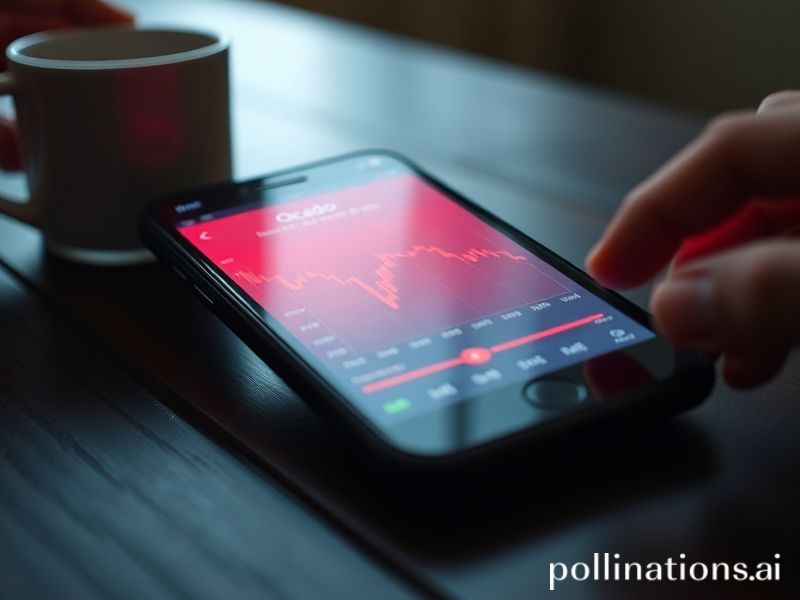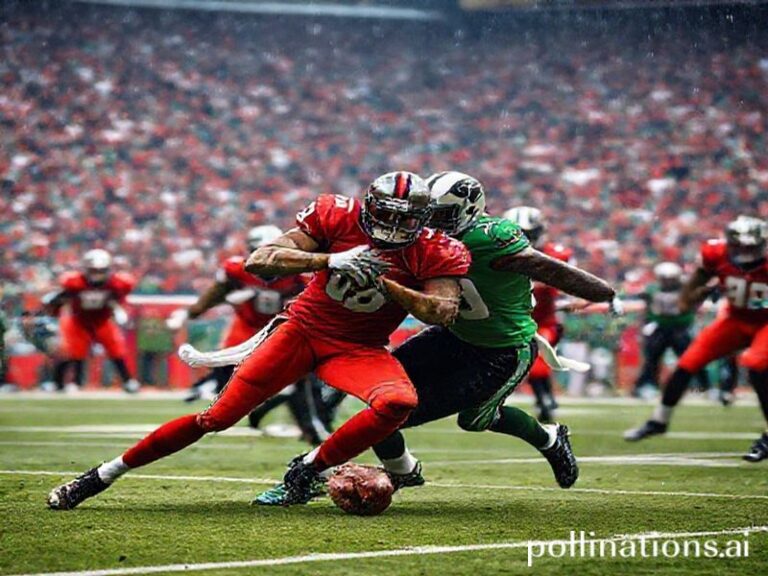Ocado’s Share Price: Canary in the Global Panic Room or Just Expensive Bananas?
Ocado’s Share Price: A Canary in the Global Panic Room
International correspondents like to pretend their beat is the fate of nations. In truth, we spend most of our time watching spreadsheets dressed up as destiny. Take Ocado Group, the British online grocer turned warehouse-robot evangelist. Its share price has become less a financial metric and more a mood ring for the planet’s collective neuroses—green when we’re optimistic about never leaving the sofa again, a queasy yellow whenever someone whispers “recession” in seven languages.
Last week the stock lurched down 7 % in a single morning, which sounds trivial until you remember that 7 % of Ocado is roughly the GDP of Belize. Analysts blamed “margin guidance,” but seasoned observers know the real culprit is humanity’s inability to decide whether convenience is salvation or the final surrender. In Seoul, Tokyo, and Stockholm, algorithms trained on British shopping carts are being copied by local start-ups promising groceries at the speed of guilt. Each hiccup in Ocado’s valuation therefore ricochets through boardrooms from São Paulo to Singapore, where men in excellent sneakers reassure each other that robots definitely won’t unionize.
The international significance is deliciously grim. Ocado’s warehouses—cathedrals of stainless steel and conveyor belts—look like what would happen if Amazon and a dystopian film set had a baby and raised it on just-in-time inventory. Governments watch the model the way medieval peasants watched comets: with awe, fear, and the sneaking suspicion that whatever it portends, the harvest will be lousy. When Ocado signs a licensing deal in Australia or Canada, foreign ministers don’t comment, yet somewhere a trade attaché updates a briefing titled “Food Security Implications of Automation, 2035.” The share price is merely the polite applause at the end of that silent opera.
Currency markets notice, too. A weaker pound makes Ocado’s tech-licensing fees cheaper for Kroger in the United States and Coles Down Under, so the stock bounces whenever sterling catches a cold. Thus a rainy Tuesday in Manchester can goose a supermarket chain in Cleveland, proving once again that globalization is just a very long piece of string with our collective anxiety tied to the end. Meanwhile, oil traders eye Ocado’s energy costs the way vultures eye a limping zebra; every kilowatt the robots consume is another geopolitical tremor in the Gulf. We are all hostages to someone’s refrigerated broccoli.
The broader significance? Picture the world as a late-night diner. In booth one, the climate negotiators argue over the last plant-based sausage. In booth two, central bankers debate whether raising rates will finally kill inflation or merely annoy it. Ocado is the exhausted waitress carrying plates between them, praying nobody asks where the electricity comes from. Its share price is the tip jar: if it rattles loudly enough, we pretend the system works; if it’s empty, we discover who’s willing to dine-and-dash on the future.
And yet the robots keep gliding, serene as monks, packing punnets of blueberries with mechanical tenderness. Investors, like the rest of us, oscillate between marvel and dread—marvel that such elegance is possible, dread that we’ve traded the corner shop’s gossip for an algorithm’s silence. Somewhere a pension fund in the Netherlands is long Ocado because “e-commerce penetration has legs.” Somewhere else a Gen-Z coder in Jakarta is shorting it because “people will remember they like touching bananas before they buy them.” Both will claim vindication, and only the bananas will remain unbruised.
In conclusion, the Ocado share price is less a number on a screen than a global Rorschach test. Tell me what you see—growth stock, speculative bubble, post-human grocery salvation—and I’ll tell you what you fear. The robots, at least, have the decency not to laugh. They simply keep stacking crates, indifferent to our metaphysical crises, which is probably why we both envy and resent them. Until the next earnings call, we remain what we have always been: anxious primates with Wi-Fi, watching a line graph pretend to be the future.







